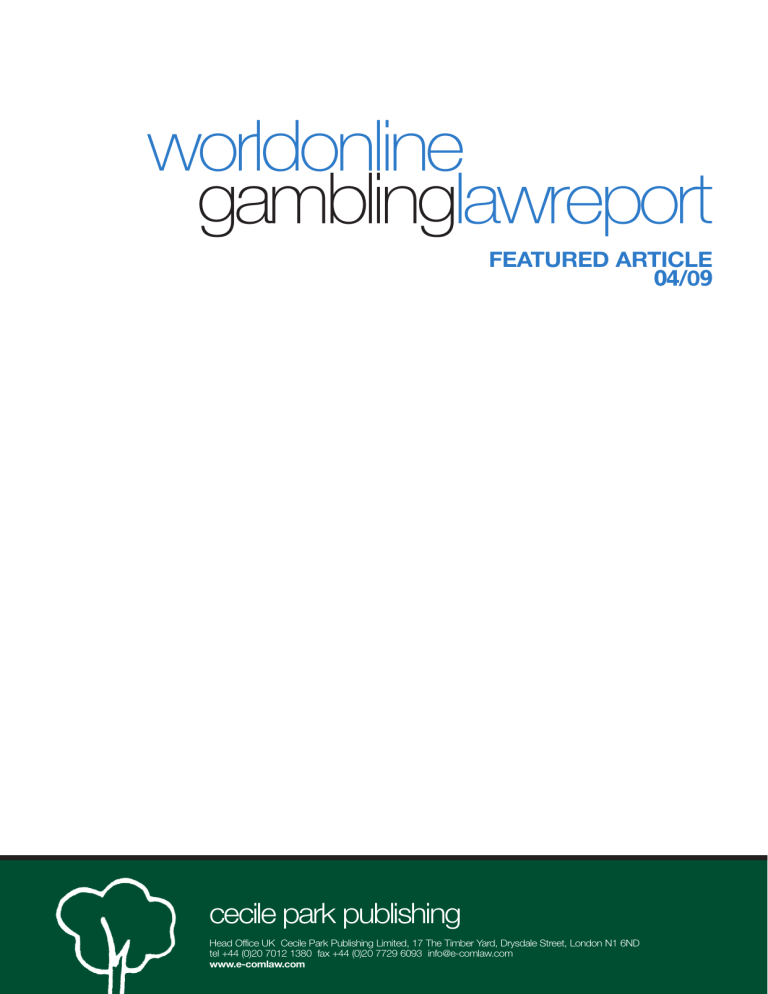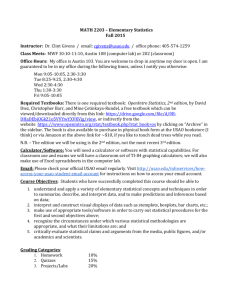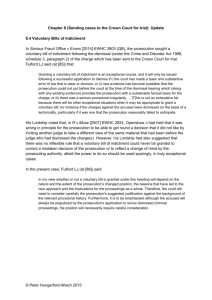worldonline lawreport gambling cecile park publishing

worldonline gambling lawreport
FEATURED ARTICLE
04
/0
9
cecile park publishing
Head Office UK Cecile Park Publishing Limited, 17 The Timber Yard, Drysdale Street, London N1 6ND tel +44 (0)20 7012 1380 fax +44 (0)20 7729 6093 info@e-comlaw.com
www.e-comlaw.com
US
08
After nearly two years of negotiations, on 6 April,
PartyGaming PLC, the parent company of Party Poker, entered into a non-prosecution agreement
(‘Agreement’) with the United
States Attorney’s Office for the
Southern District of New York
(USAO). As part of the Agreement,
PartyGaming admitted to violating a number of federal statutes, including the Illegal Gambling
Business Act 18 U.S.C. §1955; the
Wire Fraud statute 18 U.S.C.
§1343; and the Bank Fraud statute
18 U.S.C. §1344. In the Agreement,
PartyGaming agreed to forfeit $105 million and provide future cooperation in exchange for the assurance that the USAO will not prosecute the company or any of its subsidiaries ‘for any crimes related to PartyGaming’s internet gambling business with customers in the United States from 1997 through and including 2006’.
After the announcement of
PartyGaming’s Agreement with the
USAO, the value of PartyGaming’s stock on the London Stock
Exchange shot up and the blogs were abuzz with talk suggesting that PartyGaming could no longer be prosecuted in the United States.
However, a review of the
Agreement reveals that suggestion is not a certainty. There are limitations, for both parties, on the reach of the Agreement. For example, if PartyGaming violates or fails to comply with the
Agreement’s terms - including the
Analysis of PartyGaming’s non-prosecution agreement
PartyGaming recently agreed to pay
$105 million over three years in a non-prosecution agreement with the
US Attorney’s Office for the
Southern District of New York. Linda
J. Shorey and colleagues at K&L
Gates LLP examine the Agreement and the requirements PartyGaming must meet to avoid US prosecution.
ongoing cooperation requirements
- it could again be subject to prosecution by the USAO and all statements it had made as part of its cooperation would be admissible as part of the case.
This article will examine the
Agreement, looking at the scope of the non-prosecution protections, the obligations PartyGaming must meet to ensure those protections are preserved, and what can happen if PartyGaming does not meet its obligations.
The Agreement
The Agreement defines the scope of the protection from prosecution that PartyGaming gained.
Significant aspects include:
G
The USAO will not criminally prosecute PartyGaming or its subsidiaries for any crimes, except criminal tax violations, related to
PartyGaming’s internet gambling transactions with customers in the
US from 1997 through 2006.
G
The USAO will not use information provided to it by
PartyGaming in any prosecution against PartyGaming for tax violations.
G
No protection is given against prosecution for any crimes except those related to PartyGaming’s internet gambling transactions with US-based customers from
1997 through 2006.
G
No other federal, State, or local agencies - including licensing and regulatory authorities - are bound by the Agreement.
Non-prosecution and other cooperation agreements are contractual in nature. Therefore, the Agreement covers only what it states and binds only those who consented to be bound by it 1 .
Indeed, the United States
Attorney’s Manual suggests that non-prosecution agreements be drawn in narrow terms that do not bind non-party prosecutors or agencies (USAM 9-27.630). By its terms, the PartyGaming Agreement binds only the USAO. It does not prevent a United States Attorney from another federal district, a
State Attorney General, or a local
District Attorney within a State from deciding to pursue their own investigations and prosecutions of
PartyGaming, based on
PartyGaming’s activities in the US between 1997 and 2006.
As a practical matter, however, were other prosecuting agencies to pursue prosecutions in the face of the Agreement, it would undermine the use of nonprosecution agreements generally.
What motivation would there be for a prosecution target to cooperate if the target could still face prosecution by another prosecuting agency for the conduct at issue? The type of cooperation provisions that are often included in non-prosecution agreements, like those in the PartyGaming
Agreement, can be valuable to prosecuting agencies, even those who are not signatories. Therefore, cooperation provisions operate as a restraint on other prosecuting agencies and, in practice, additional prosecutions are rare.
The consequences of failing to fulfill obligations
PartyGaming’s continuing cooperation obligations include:
G
Cooperating fully and actively with the USAO, the FBI and any other designated agency regarding any matter relating to the USAO’s investigation.
G
Truthful and complete disclosure of all information with respect to the activities of
PartyGaming, its officers and employees concerning anything about which the USAO inquires.
G
Using its best efforts to assist the
USAO in any prosecution or investigation by providing logistical and technical support for any meeting, interview, grand jury world online gambling june 2009
US proceeding, or trial or other court proceeding identified by USAO.
G
Using its best efforts to secure the attendance and truthful statements of current and former officers, agents, and employees at any meeting, interview, grand jury proceeding, trial or other court proceeding identified by USAO.
G
Using its best efforts to provide any document, record, or other evidence relating to the continuing investigation in its own and related internet gambling matters, including evidence concerning payment processing methods.
G
Informing the USAO of all criminal conduct by - and any investigation of - it or its employees that come to the attention of its Board of Directors or senior management, as well as any government action in which it is a party (aside from routine licensing-related proceedings in foreign jurisdictions).
The Agreement establishes consequences if PartyGaming
‘commit[s] any crimes subsequent to the date of the signing of [the]
Agreement’ or ‘fail[s] to comply with its forfeiture/disgorgement obligations’, or if it is determined that ‘PartyGaming or any of its representatives have given false, incomplete, or misleading testimony or information, or has otherwise violated a provision of the Agreement’. Those consequences are that:
G
PartyGaming would be ‘subject to prosecution for any federal offense of which [the USAO] has knowledge’;
G
‘all statements made by
PartyGaming representatives
[would] be admissible in evidence in any criminal proceeding brought against PartyGaming and relied upon as evidence to support any penalty imposed on
PartyGaming’; and
G
PartyGaming would be prohibited from asserting a claim
The USAO might determine that
PartyGaming had not fulfilled its duties under the
Agreement and, therefore, would move forward with prosecution under the United States
Constitution or any statute or federal rule that such statements or leads therefrom should be suppressed, or that prosecution should be barred by any applicable statute of limitations.
The broad nature of the
PartyGaming Agreement, the ongoing obligation to cooperate, and the reservation by the USAO of the right to prosecute in the event of non-compliance makes possible a scenario in which the
USAO might determine that
PartyGaming had not fulfilled its duties under the Agreement and, therefore, would move forward with prosecution.
Can a determination of noncompliance be challenged?
One issue that can arise in relation to non-prosecution and other agreements with the government that impose extended cooperation obligations is what recourse a defendant has if the government determines the provisions of a non-prosecution agreement have been breached? The due process protection provided by the US
Constitution requires that when the government determines there has been non-compliance with a non-prosecution agreement and wishes to be relieved of performing its part of the bargain, it may not make this decision unilaterally 2 .
In practice, however, due process protection may not protect against the harm sought to be avoided by entering into a non-prosecution agreement - i.e. the investigation, indictment, and other elements of the prosecution. In many jurisdictions, courts have held that due process only entitles a defendant claiming the agreement was not breached to a judicial determination of the issue prior to conviction rather than prior to indictment, because the interest alleged to be deprived is in world online gambling june 2009 avoiding conviction, not in avoiding a prosecution 3 .
In seeking to enter into nonprosecution agreements, companies typically want to avoid indictment and trial and the likely business consequences of both.
Although courts will review the bases for a declaration of noncompliance, the post-indictment nature of the review might negate much of the reason for entering into a non-prosecution agreement in the first instance. Even with this choice, however, many companies choose to accept the risk of possible indictment due to an alleged future breach rather than face the near-term likelihood of an indictment and trial in the absence of a non-prosecution agreement.
Conclusion
While a non-prosecution agreement may have benefits that outweigh the consequences of failure to cooperate with the government, it is important for companies to understand that, generally, such agreements are not binding on non-signatory jurisdictions and that the obligations in the agreement must be fulfilled throughout its term in order for it to be binding in the signatory jurisdiction.
Linda J. Shorey Partner
Dennis M.P. Ehling Partner
Fred A. Heather Partner
Ashley J. Camron Associate
Anthony R. Holtzman Associate
K&L Gates LLP linda.shorey@klgates.com
dennis.ehling@klgates.com
fred.heather@klgates.com
ashley.camron@klgates.com
anthony.holtzman@klgates.com
1. See, e.g., United States v. Castaneda,
162 F.3d 832, 835 (5th Cir. 1998), United
States v. Yemitan, 70 F.3d 746, 747 (2nd
Cir. 1995).
2. See, e.g., United States v. Castaneda,
162 F.3d 832, 836 (5th Cir. 1998).
3. See, e.g., United States v. Meyer, 157
F.3d 1067, 1076-77 (7th Cir. 1998);
Stolt-Neilsen, S.A. v. United States, 442
F.3d 177, 184 (3rd Cir. 2006).
09
cecile park publishing
Head Office UK Cecile Park Publishing Limited, 17 The Timber Yard, Drysdale Street, London N1 6ND tel +44 (0)20 7012 1380 fax +44 (0)20 7729 6093 info@e-comlaw.com
www.e-comlaw.com
Registered number 2676976 Registered address 141 Wardour Street, London W1F 0UT VAT registration 577806103
e-commerce law & policy
Many leading companies, including Amazon, BT, eBay, FSA, Orange, Vodafone,
Standard Life, and Microsoft have subscribed to ECLP to aid them in solving the business and legal issues they face online.
ECLP, was nominated in 2000 and again in 2004 for the British & Irish Association of Law Librarian’s Legal Publication of the Year.
A twelve month subscription is £
420
(overseas £4
40
) for twelve issues and includes single user access to our online database.
e-commerce law reports
You can now find in one place all the key cases, with analysis and comment, that affect online, mobile and interactive business. ECLR tracks cases and regulatory adjudications from around the world.
Leading organisations, including Clifford Chance, Herbert Smith, Baker &
McKenzie, Hammonds, Coudert Brothers, Orange and Royal Mail are subscribers.
A twelve month subscription is £
420
(overseas £4
40
) for six issues and includes single user access to our online database.
data protection law & policy
You can now find in one place the most practical analysis, and advice, on how to address the many problems - and some opportunities - thrown up by data protection and freedom of information legislation.
DPLP’s monthly reports update an online archive, which is an invaluable research tool for all those who are involved in data protection. Data acquisition, SMS marketing, subject access, Freedom of Information, data retention, use of CCTV, data sharing and data transfer abroad are all subjects that have featured recently.
Leading organisations, including the Office of the Information Commissioner, Allen
& Overy, Hammonds, Lovells, BT, Orange, West Berkshire Council, McCann
Fitzgerald, Devon County Council and Experian are subscribers.
A twelve month subscription is £3
90
(public sector £2
8
5, overseas £
410
) for twelve issues and includes single user access to our online database.
world online gambling law report
You can now find in one place analysis of the key legal, financial and regulatory issues facing all those involved in online gambling and practical advice on how to address them. The monthly reports update an online archive, which is an invaluable research tool for all those involved in online gambling.
Poker, payment systems, white labelling, jurisdiction, betting exchanges, regulation, testing, interactive TV and mobile gaming are all subjects that have featured in WOGLR recently.
Leading organisations, including Ladbrokes, William Hill, Coral, Sportingbet,
BskyB, DCMS, PMU, Orange and Clifford Chance are subscribers.
A twelve month subscription is £
520
(overseas £
540
) for twelve issues and includes single user access to our online database.
world sports law report
WSLR tracks the latest developments from insolvency rules in football, to EU
Competition policy on the sale of media rights, to doping and probity. The monthly reports update an online archive, which is an invaluable research tool for all involved in sport.
Database rights, sponsorship, guerilla marketing, the Court of Arbitration in
Sport, sports agents, image rights, jurisdiction,domain names,ticketing and privacy are subjects that have featured in WSLR recently.
Leading organisations, including the England & Wales Cricket Board, the
British Horse Board, Hammonds, Fladgate Fielder, Clarke Willmott and
Skadden Arps Meagre & Flom are subscribers.
A twelve month subscription is £
520
(overseas £5
40
) for twelve issues and includes single user access to our online database.
■ Please enrol me as a subscriber to e-commerce law & policy at £
420
(overseas £4
40
)
■ Please enrol me as a subscriber to e-commerce law reports at £3
20
(overseas £4
40
)
■ Please enrol me as a subscriber to data protection law & policy at £3
90
(public sector £2
8
5, overseas £
410
)
■ Please enrol me as a subscriber to world online gambling law report at £
520
(overseas £5
40
)
■ Please enrol me as a subscriber to world sports law report at £
520
(overseas £5
40
)
All subscriptions last for one year. You will be contacted at the end of that period to renew your subscription.
Name
Job Title
Department
Address
Address
City
Country
Telephone
Company
State
Postcode
Fax
Purchase order number 1 Please invoice me
Signature Date
2 I enclose a cheque for the amount of made payable to ‘Cecile Park Publishing Limited’
VISA
■
MASTERCARD
■ 3 Please debit my credit card
Card No.
Expiry Date
Signature Date
VAT No. (if ordering from an EC country)
Periodically we may allow companies, whose products or services might be of interest, to send you information.
Please tick here if you would like to hear from other companies about products or services that may add value to your subscription.
■



